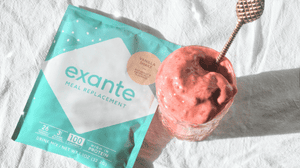
The Keto Diet might have come up in your research for weight loss diets. Sometimes researching diets can get really confusing, and the Keto Diet is no exception. With lots of scientific details and confusing numbers, it can be really easy to do the Keto Diet incorrectly and hurt your body and your weight loss goals. I wanted to give you guys a quick overview of the Keto Diet because it’s gotten quite popular in the weight loss and fitness communities, and I want you guys to succeed.
I have seen lots of people try lots of diets. I’ve done my research on the Keto Diet and I’m excited to share what I’ve learned with you. Are you ready?

What is the Keto Diet?
The Keto Diet, or the Ketogenic Diet, is focused on low carbs and producing something called ketones in the liver to be used as energy rather than using glycogen, or stored carbs.
What is Ketosis?
The purpose of a ketogenic diet is to put the body into ketosis. Ketosis is when the body runs out of glucose (broken down carbs) to use as energy, so it turns to stored fat for fuel which results in a build-up of acids in the body called ketones.
What are Ketones?
Ketones are by products of the body breaking down fat for fuel as opposed to glucose.
What are the benefits of the Keto Diet?
The Ketogenic Diet can
Reduce insulin levels and inflammation.
Produce weight loss results
Reduce appetite, because a high-fat diet will keep you full for longer.
Reduce fat storage/increases fat burning.
Increase thermogenesis—the number of calories you burn daily.
Some studies have also shown that the Keto Diet can improve cognition, mental clarity, and memory. Those benefits really sound great, but before you make a lifestyle change you should always research the positive and the negative.
What are the setbacks of the Keto Diet?
The Ketogenic Diet is a restrictive way of eating that can be very difficult to maintain. It’s important to understand the setbacks before you make a big change to your lifestyle. Some of the setbacks include:
Fatigue and brain fog while your body adjusts.
Possibly burn muscle instead of fat, because the process to use fat for energy is slow. If you do not follow the diet exactly, your body will use protein or muscle, for fuel.
Higher risk for heart disease and stroke, because diets high in saturated fats will increase your levels of unhealthy cholesterol (LDL).
High LDL levels can increase your risk of heart disease and stroke. - diets high in saturated fats will increase your LDL levels (the unhealthy cholesterol) which can increase your risk of heart disease and stroke.
Irregular bowel movements can occur, because the Keto Diet is low in fiber and other plant-based nutrients that help keep you ‘regular’.
Decreased performance during high-intensity activities, because high-intensity activities use carbohydrates, not fat, for fuel.
Gaining back the weight when ending the diet.
While the Keto Diet has helped many people lose weight, my advice is to make a well-rounded lifestyle change, including healthy carbohydrates and fibers. A healthy lifestyle is much easier to maintain because nothing is severely restricted. Personally, I like the ability to eat whatever I’d like during the day as long as it falls in my meal plan. A healthy lifestyle makes me feel better than any diet ever has.
Make Your Lifestyle Change Today

A diet isn’t a lifestyle change, but choosing healthy options and planning your meals is a long term, sustainable change you can make today.

Related Articles








